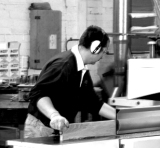In this Guest Blog from BWF's auditors, Begbies Chartered Accountants discuss how to get the most from R & D tax credits.
Is your company eligible for R&D tax credits? The chancellor’s announcement at Budget 2017 that administration of the scheme will be simplified is a further nudge for companies to review their expenditure.
 This is a relief that HMRC are keen to promote and in November 2016 they published Research and development tax relief: Making R&D easier for small companies. BWF members may be particularly interested in the case study concerning advanced materials. This example discusses research costs incurred in developing and amending a material to resolve an uncertainty, in this case ‘cold weather’ issues. If your company is undertaking a project to improve or develop materials technology, then it may qualify for R&D tax credits.
This is a relief that HMRC are keen to promote and in November 2016 they published Research and development tax relief: Making R&D easier for small companies. BWF members may be particularly interested in the case study concerning advanced materials. This example discusses research costs incurred in developing and amending a material to resolve an uncertainty, in this case ‘cold weather’ issues. If your company is undertaking a project to improve or develop materials technology, then it may qualify for R&D tax credits.
The two key criteria for a project to qualify are that it seeks an advance in a field of science or technology and that this involves uncertainty. It needs to be more than simply commercial innovation. The tax credits provide additional tax relief for the costs of the project which will typically include wages, subcontractors, consumables and prototypes.
So how do R&D tax credits work? Under the SME scheme, the tax credit enhances eligible expenditure by 130%. This ‘enhancement’ is worth 26% of the costs (at a corporation tax rate of 20%). Loss making companies can opt to claim a tax refund of 14.5% to assist with cashflow (rather than carrying forward losses). The large company RDEC scheme is slightly different and provides a tax credit of 11%.
Claims are administered through the company’s corporation tax return and it is important to attach supporting information containing details of the project, R&D criteria and expenditure. R&D tax credits can be claimed up to two years following the end of the accounting period so, if you think you have qualifying R&D expenditure, it may not be too late to claim.
Christopher Bates FCA
Begbies Chartered Accountants
BWF's employment, legal and tax guidance is one of the most developed areas of our support for woodworking companies. Joinery firms are businesses, and our business support services help woodworking firms run their businesses more effectively with guidance on employment, legal and tax issues – including a helpline; a credit checking service and grant/finance finding search facility; tailored insurance deals; and our Code of Conduct guide, providing a suite of resources to help businesses run professionally and smoothly. We have also drawn up a structured process for business owners to identify the most likely or damaging risks in their joinery manufacturing and woodworking firm. BWF members can access the risk matrix within the BWF's General Business Support Publications.

 This is a relief that HMRC are keen to promote and in November 2016 they published
This is a relief that HMRC are keen to promote and in November 2016 they published